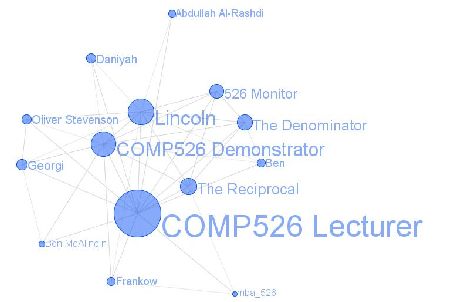
Professor Leszek Gąsieniec is the Head of Computer Science. Earlier this year, he used Twitter to support the delivery of a postgraduate module, called Applied Algorithmics.
“In recent years we have noticed that certain students do not read university email on a regular basis. Students tend to use their private email accounts on Yahoo, Google, or stick to other communication technologies that naturally incorporate multimedia and reporting mechanisms allowing to engage in a more attractive (and complex) dialogue.
Twitter appears to provide a powerful alternative to email communication as it provides a good compromise between a professional communication tool and a multimedia storage platform.
This year we adopted Twitter as the communication tool for a relatively small module on Applied Algorithmics. The module provides amalgamate of theory of algorithms with problem solving accompanied by several software implementations.
Apart from lectures combined with tutorials, students attend labs during which they work on Java assignments that are tested and assessed on our internally developed electronic feedback-submission system.
An open and public forum
As the students can submit their work multiple times seeing (anonymously) their performance with respect to the others they tend to ask questions, looking for hints and clarifications.
This process requires a good communication tool. We set up new Twitter accounts for all of the students on the module, including myself, the tutor and one of my PhD students who monitored the system as part of his research interest.
During delivery of the module we used Twitter for communication almost solely. Several students used the tool extensively, and others only followed our discussions.
The public conversation was open to all students. In fact it is still open to everyone. In addition several private messages exchanged between the lecturer and the individual students. I can only assume that the students used private communication between themselves too.
Avantages and disadvantages
While the use of Twitter was experimental and we did not use its capability to the full extent, the students’ feedback was very positive and encouraging to prolong its use in the following years.
There were many advantages to using this approach. Twitter provides an open (public) forum and almost all messages, with exception of dedicated private communication, is available for others to read. This includes those who do not attend the module. Such open forum encourages greater engagement including direct contact and discussions.
In contrast to email, Twitter API is an open multimedia platform that allows collection and further analysis of messages, images, videos which can be used, to understand the mechanics of course engagement including communication.
There are, however, some disadvantages too. You need to set up new Twitter accounts for everyone on the course. Social media is chiefly used to comment on life problems, politics, so occasionally this type of messages may slip in during course related exchange of messages. Importantly, the course leader must be a Twitter enthusiast or it simply won’t work.
The next step would be to test it on larger modules, but I would certainly encourage my colleagues in Computer Science and other fields to try it out.
The material of the module is available at http://cgi.csc.liv.ac.uk/~leszek/COMP526/ including the link to COMP526 Twitter account https://twitter.com/lag_526.


Great to see the subject of Twitter for learning and teaching coming up again. Readers might be interested in these five short videos that the eLearning Unit created last year. We interviewed Dr Leah Ridgway about Twitter and her use of it for her Learning & Teaching.
You can access via Stream from the list below:
1. Using Twitter in Higher Education https://stream.liv.ac.uk/mr6fwea7
2. How do you use twitter? https://stream.liv.ac.uk/35bd535m
3. Twitter for students https://stream.liv.ac.uk/2k4vy6pf
4. Twitter for staffhttps://stream.liv.ac.uk/vgm3rass
5. A twitter example https://stream.liv.ac.uk/dp4sugct
This is a good selection of Twitter related material.
Many thanks or the links. Leszek
Interesting piece – thanks. I lectured 400 first year life science students yesterday, and we used twitter so they could ask questions, make comments, and interact; good fun, and quite informative
its all on https://twitter.com/RunningMadProf
@RunningMadProf
My module was much smaller and dealing with 400+ students poses different type of challenges. Our Software Lab (http://www.liv.ac.uk/network-science-technologies/nest-structure/development/members/) is currently developing a software meant to support display of life Twitter messages (including comments) at large events. I believe this could be of some interest to you too. @LAGasieniec